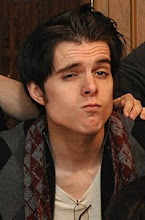My dad recently told me that, to him, photography is a person's attempt at showing others the way that they see the world. I've carried this around with me the last couple of weeks and it occurs to me that it is very profound in its own way. At a most basic state, a photograph is really just a still representation of something that exists in this world. In other words you could say that it is mundane. When one thinks then as my dad does, a picture becomes something much more interesting. The way a picture is taken, its subject, and even the location all inform the viewer of the unique way that a person views the world; the mundane can suddenly mean a lot more. Taken this way, the act of photography is actually intensely personal, however intentionally a picture is taken.

With this thought process recently in mind, I set out to not only take a few new pictures, but to search out some of my old ones and figure out something about myself. Why did I take the picture? What did I feel? And what was I trying to say to everyone else about my world view? It's actually a very interesting process to discover something about yourself that you may have only been subconsciously aware.
I consider myself a bit of an artist, or more realistically someone with an artistic mind. I often find myself looking for detail and symmetry. Colors that really stand out. I especially like light and especially that at night. With this in mind I found it intriguing that it apparently seems in almost all of my own photography I'm desperately trying to capture whatever it is that I am seeing and feeling in that moment. The funniest part about this endeavor, as with most art, is that I often times struggle to succeed. Very seldom does it seem I ever really capture the essence of my own vision. I find this frustrating, but admit freely that sometimes the most beautiful moments can be captured by accident. Allowing myself to accept this fact, I poured over the last six months of pictures stored on my computer with an eye to spot not only the beauty in any particular moment, but my own emotional and artistic intention...

... And found lots to look at. Sometimes the picture felt close to what I was aiming for and in some cases I'm so far removed from those moments that the pictures become something else. Nevertheless I started picking out images that I felt I was relatively close to capturing and decided to see if I couldn't maybe coax the last bit of personality out of them. In other words, make those visions uniquely mine to the world. This involved a heavy amount of photo manipulation on my part. Normally I am trained to scoff at the practice, but it occurs to me that by adjusting these images I am only making the effort to expose in some manner the feeling of the things I am seeing.
Now, in a lot of cases the editing began slowly and I attempted to keep the changes minor. In some cases this was all that was necessary to achieve my desired effect. In others I made a discovery that perhaps the moment I was in and the picture I was taking were an attempt to emulate the scene I wish I could see. It's natural to want your own perfect version of life and it's also natural to never really achieve that. As I slowly pushed the contrasts and the color balances in differing and more dramatic directions I realized I could turn the world I've seen into the world in my head. There's something oddly poetic about the process that I really appreciate -- taking the real world and adjusting it ever so slightly to match the ideal version in my brain.

I realize the practice is slightly counter-purpose to photography. There are some that would argue that when you take a photo, you're trying to capture that moment as real as it is forever. And while I can imagine the practical applications of such a practice I cannot help but be bored by it. If, as my dad so helpfully put it, the purpose of photography is to share your unique view of the boring everyday, then maybe what I've done is an extension of that. Some of the pictures featured here say a lot about me, or at least how I'd like to think I see existence. They represent places I've been and, at the same instant, places I'll never be. That's a really tough nut to crack, but I can't help but believe that it's a lot like living.



